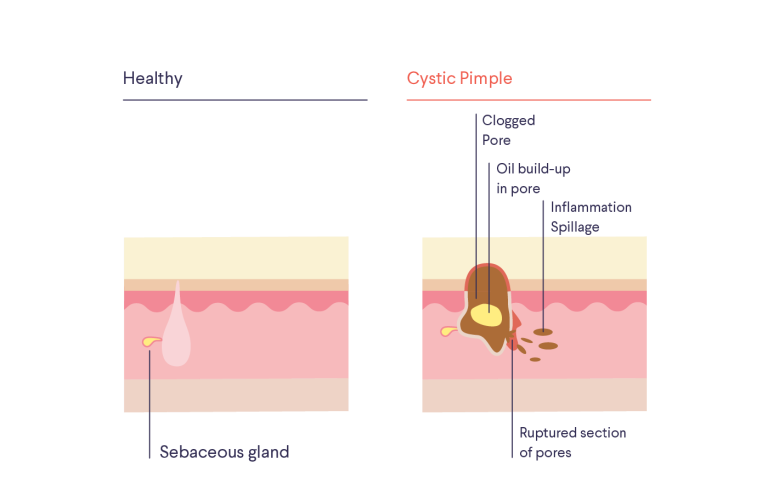How it works:
Share your skin goals and snap selfies
Your dermatology provider prescribes your formula
Apply nightly for happy, healthy skin
How it works:
How it works:
Share your skin goals and snap selfies
Your dermatology provider prescribes your formula
Apply nightly for happy, healthy skin
How it works:
Abscess vs. cyst: what are they, and how are they different?
Abscess vs. cyst: the difference between these skin conditions.



Skin is a pretty big deal—it’s your body’s largest organ! That’s why, when something seems a little off, you usually notice, fast. So, what happens if you can see or feel the rumblings of an abscess or cyst? These skin conditions can be very frustrating to deal with, which is why it’s important to know how to identify them. That way, you can talk with your medical provider and properly treat them.
Here we’ll break down what exactly are skin abscesses and cysts, what causes them, how they differ, and what you can do about them.
What are abscesses and cysts?
What is an abscess?
There are many types of abscesses, such as dental abscesses or gland abscesses, but the ones that occur on the skin’s surface are called cutaneous abscesses:¹ pockets of pus that can be hard or fluctuant and tender to the touch. They usually appear erythematous (red).
What is a cyst?
Epidermoid cysts are the most common type of skin cysts that appear as a closed sac filled with keratin. You'll usually find them on the face, neck, or the trunk, and they're normally painless unless they become inflamed.²
What are the main differences between a skin abscess and a cyst?
Cutaneous abscesses are usually red, swollen, and painful. Most of them are infected,³ while epidermoid cysts are generally harmless.
Epidermoid cysts aren't usually painful, but if the cyst ruptures it may become inflamed and painful. And if an infection develops an abscess may form. However, an abscess doesn't necessarily always begin as a cyst. Abscesses can form on their own.

What are the causes of skin abscesses and cysts?
What causes cutaneous abscesses?
A bacterial infection can cause a cutaneous abscess, typically the result of a cut, wound, or an infected hair follicle.⁴ When there is a break in the skin, microbes begin to invade the area and a collection of pus develops—and an abscess results.⁵
What causes epidermoid cysts?
Blocked hair follicles normally cause epidermoid cysts.⁶ They become filled with keratin, a "cheesy"-looking protein that helps form your hair, nails, and skin's outer layer—your epidermis.
Your skin constantly sheds, and when the dead skin doesn't slough off but instead moves deeper into the skin, it can build up and form epidermoid cysts.⁷
How do you treat a skin abscess or cyst?
How to treat cutaneous abscesses
The treatment of a skin infection, such as an abscess, will typically depend on the severity and location. Some small cutaneous abscesses may shrink or disappear by themselves. If you think you have an abscess, it's best to keep an eye on it. It might even open up on its own, with the infection clearing up in just a few days. If you want to speed up this process, try using warm compresses on the affected area.⁸ If the abscess gets bigger or more painful, you should seek medical attention to determine the best treatment. At times, a medical provider may need to do a small in-office procedure to drain the abscess.

However, for uncomplicated skin abscesses, studies have shown that oral antibiotics, such as clindamycin or trimethoprim/sulfamethoxazole, may be beneficial. Unfortunately, both of these might lead to diarrhea as a side effect, clindamycin more so.⁹ If you have any concerns about side effects from antibiotics, discuss this and other treatment options with your medical provider.
How to treat an epidermoid cyst
Although the majority of epidermal cysts are benign, it is important to consult a medical provider if you notice this on your skin. Often times the cysts will be removed and evaluated to ensure that they are benign and there is not another underlying cause.¹⁰
If you notice any new or unusual spots on your skin, it’s always best to be evaluated by an in person medical provider for evaluation and possible treatment.

For all the pimple poppers out there, while it's often tempting to pop a cyst, it's not a good idea as you run the risk of spreading any infection that may be inside it.
Curology can help you improve your skincare routine
It’s important to care for your skin. One way to do this is by investing in a skin regimen tailored to your individual needs. If you're not sure how best to treat your skin, Curology can help make the process simpler.
Get your personalized skincare routine with Curology
Get your personalized skincare routine with Curology


To get started, you’ll just need to answer some questions and snap a few selfies. If Curology is right for you, you’ll be paired with one of our licensed dermatology providers, so you can start your trial* and receive skincare product recommendations and a personalized prescription formula.
FAQs
Poor hygiene can contribute to the formation of abscesses, but it's not the only reason. However, maintaining healthy hygiene is still important.
Small abscesses may disappear on their own, but bigger ones might require antibiotics and/or more extensive treatment by a licensed medical provider.
Skin cysts are typically harmless, however, if you notice any new cysts it is recommended to book an appointment with a medical provider who can provide a diagnosis and offer treatment, if necessary.
Acne cysts are typically larger than your average pimple. They're raised red bumps that don't have a whitehead at the surface and shouldn't be picked at or popped.
If you want to help prevent cystic acne, use oil-free cleansers, non-comedogenic facial products, and every so often, a chemical exfoliator to help shed dead skin cells and unclog pores. One product you may want to incorporate is our Gentle Cleanser. It’s dermatologist-designed and made for all skin types—including acne-prone.
P.S. We did the homework, so you don’t have to:
Rehmus, W.E. Cutaneous Abscess. Merck Manual. (February 2021).
Zito, P.M. and Scharf, R. Epidermoid Cyst. National Library of Medicine. (2022, August 25).
Stevens, D.L., et al. Practice Guidelines for the Diagnosis and Management of Skin and Soft-Tissue Infections. Clinical Infectious Diseases. (2005, November 15).
Baiu, I. and Melendez, E. Skin Abscess. JAMA Network. (2018, April 3).
Thomas, O., et al. The surgical management of cutaneous abscesses: A UK cross-sectional survey. Annals of Medicine and Surgery. (December 2020).
Zito, P.M. and Scharf, R. Epidermoid Cyst. National Library of Medicine. Ibid.
Hoang, V.T., et al. Overview of epidermoid cyst. European Journal of Radiology Open. (2019, September 5).
Rehmus, W.E. Cutaneous Abscess. Merck Manual. Ibid.
Wang, W., et al. Antibiotics for uncomplicated skin abscesses: systematic review and network meta-analysis. BMJ Journals. (2018, January 17).
Zito, P.M. & Scharf, R. Epidermoid Cyst. National Library of Medicine. Ibid.
Laura Phelan is a board-certified Family Nurse Practitioner at Curology. She earned her Masters of Science in Nursing at Benedictine University and went on to get her post-master’s certificate as a Family Nurse Practitioner at the University of Cincinnati.
*Cancel anytime. Subject to consultation. Results may vary.

Curology Team

Laura Phelan, NP-C